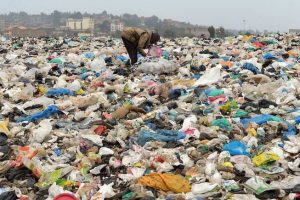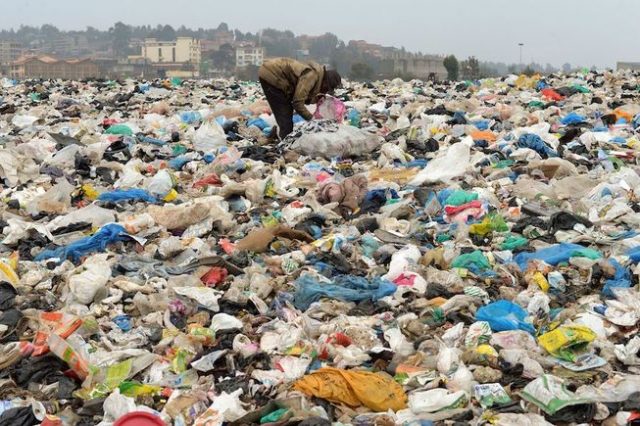Solid waste management is the most pressing environmental challenge faced by urban and rural areas of Nigeria. Nigeria, with population of about 200 million, is one of the largest producers of solid waste in Africa. Despite a host of policies and regulations, solid waste management in the country is assuming alarming proportions with each passing day. Poor solid waste management seems to have defied solutions introduced by several administrations in Nigeria. With the country’s growing population and poor waste management habits of the populace, solid waste management has posed a threat to the environment and health of several people. Indiscriminate dumping of refuse by Nigerians has led to increasing illegal dumpsites while refuse heaps have become a common sight in popular urban centres across the country.
Nigeria generates more than 32 million tons of solid waste annually, out of which only 20-30% is collected. Reckless disposal of MSW has led to blockage of sewers and drainage networks, and choking of water bodies. Most of the wastes is generated by households and in some cases, by local industries, artisans and traders which litters the immediate surroundings. Improper collection and disposal of municipal wastes is leading to an environmental endemic as the country currently lacks adequate budgetary provisions for the implementation of integrated waste management programmes across the States.
According to the United Nations Habitat Watch, African city populations will more than triple over the next 40 years. African cities are already inundated with slums; a phenomenon that could triple urban populations and spell disaster, unless urgent actions are initiated. Out of the 36 states and a federal capital in the country, only a few have shown a considerable level of resolve to take proactive steps in fighting this scourge, while the rest have merely paid less attention to issues of waste management indicating a huge lack of interest to develop the waste sector. 
A recent United Nations Report noted that while developing countries are improving the access to clean drinking water, Sanitation is still a problem. The World Health Organization (WHO) and United Nations International Children Education Fund noted in a joint report that over 2.4 billion people could be at risk of potentially fatal diseases if the waste problem continues to be ignored. Currently, there are over 7 billion people living, a staggering number when considered in terms of potential waste. Wasteaiduk states that the Sustainable development goals cannot be achieved without the inclusion of waste management as a priority.
The issue of waste management is a global one. Various countries have developed unique ways to manage this problem and while some have achieved tremendous amounts of success, others still struggle. One of the impacts of cluster industrialisation is overpopulation. Citizens of these countries often move to the more economically promising cities (designated “big cities”) where there are more job opportunities and belief of higher standards of living. The implication of this constant migration is overpopulation. Growing cities in Asia and Africa have been identified as the most affected by the waste management problem.
The United Nations has highlighted the lack of clean water and sanitary conditions as a major hindrance to socioeconomic development, particularly in developing countries. Waste and waste management must be addressed and actively managed as it is directly related to sanitation and will ultimately lead to a reduction in risk of avoidable diseases and deaths. The Millennium development goals (MDGs) developed in the year 2000 included adequate sanitation and waste disposal as a top priority to be resolved by the year 2015. However, Nigeria was one of the countries that failed to meet their criteria.
As one of the largest producers of solid waste in Africa with its most populated city–Lagos–being the largest producer of solid waste in the country, it is clear that Nigeria should have an effective and ethical method of waste disposal. However, due to lack of management facilities in the country, both local and national, solid waste management is an issue that Nigeria continues to face to this day. Lagos state is a city built for 17 million people but is currently home to 20 million people (National Population Commission of Nigeria Report, 2016). Therefore, congestion and overpopulation are unavoidable problems. The lack of basic waste management infrastructure coupled with the city’s congestion problem makes it difficult to manage, which is taking a toll on the city and its inhabitants. Lagos State, the commercial hub of Nigeria, is the second fastest growing city in Africa and seventh in the world. The latest reports estimate its population to be more than 21 million making it the largest city in entire Africa. With per capita waste generation of 0.5 kg per day, the city generates more than 10,000 tons of urban waste every day.
Despite being a model for other states in the country, municipal waste management is a big challenge for the Lagos State Waste Management Agency (LAWMA) to manage alone, hence the need to engage the services of private waste firms and other franchisee to reduce the burden of waste collection and disposal. One fundamental issue is the delayed collection of household solid waste. In some cases, the wastes are not collected until after a week or two, consequently, the waste bin overflows and litters the surroundings.
Improper garbage disposal and lack of reliable transport infrastructure means that collected wastes are soon dispersed to other localities. Another unwelcome practice is to overload collection trucks with 5-6 tons of waste to reduce the number of trips; this has necessitated calls by environmental activist to prevail on the relevant legislature to conform to the modern waste transportation standard.
The government at the federal level as a matter of urgency needs to revive its regulatory framework that will be attractive for private sectors to invest in waste collection, recycling and reusing. The environmental health officer’s registration council of Nigeria would do well to intensify more effort to monitor and enforce sanitation laws as well as regulate the activities of the franchisees on good sustainable practices.
Taking the advocacy further on waste management, to avoid littering the environment, some manufacturing companies (e.g. chemical and paint industry) have introduced a recall process that will reward individuals who returns empty/used plastic containers. This cash incentive has been proven over time to validate the waste to wealth program embarked upon by the manufacturing companies. It is also expected that the government will build more composting and recycling plants in addition to the ones in Ekiti and Kano State to ensure good sustainable waste management.
Waste management situation in Nigeria currently requires concerted effort to sensitize the general public on the need for proper disposal of solid waste. Also, the officials should be well trained on professionalism, service delivery and ensure that other states within the country have access to quality waste managers who are within reach and can assist on the best approach to managing their waste before collection.
One of the largest barriers to recycling is the manufacturing industry. In a developing country such as Nigeria, especially in rural areas, recycling and the idea of making profit through this process is almost unattainable, as the recycling points and collectors are mostly in the urban areas and virtually unknown to the people within these communities, but commercial and material goods like residue, plastic, and the likes, are sold and used within these communities and the end in gutters or burnt, causing further environmental and health hazards.
The problem in urban areas is beyond the availability of recourses and lack of knowledge. A discussion on twitter during a recent social media waste awareness campaign revealed that some people within these areas understand someone of the implications using non-decomposable/recyclable products such as plastic and Styrofoam, but are unaware/unwilling to use alternatives. For those willing to engage the environmentally friendly disposal practices, the lack of efficient disposal mechanisms makes it difficult and near impossible. It might be impossible to change habits and use of materials without implementing higher taxes or ban of these products and adequate disposal mechanisms.
Institutions and commercial spaces have a part to play in the improvement of environmental consciousness and advancement of recycling practices. Schools, restaurants and other establishments in countries with decent to high recycling success tend to use strategies such as separation bins indicating what form of waste goes in what pile and color differences are used for indication as well. Organizations who claim to be environmentally conscious train their workers, and we find that although they might not be able to influence all of their consumers, they are successful in managing their own waste products and instilling some of these practices in their employees. Accountability with regards to social and economic responsibility is weak in Nigeria, we find that organisations are not conscious of the environmental consequences of their practices because environmental consciousness is not much of a consideration in Nigeria and we do not demand this responsibility from organizations.
Beginning with environmental consciousness within schools and public spaces may be the best way to reach large groups. The government is responsible for providing better waste disposal materials and management infrastructure, but it is not the responsibility of the government alone. The UN recognized the health risks of poor sanitation as a major sustainable development limitation. Being more conscious about where our materials come from, holding corporations and organizations responsible for their waste and supporting the organizations making the effort might be the support needed to improve the quality of life and perhaps satisfy the SDG requirements.
In developed and normal societies, waste management simply means the collection, keeping, treatment and disposal of waste in such a way as to render then harmless to human and animal life-the ecology and environment generally.
It could also be said to be the organised and systematic dumping and channeling of waste through or into landfills or pathways to ensure that they are disposed of with attention to acceptable public health and environmental safeguard. Proper waste management will result in the abatement or total elimination of pollution.
In Nigeria, managing waste disposal has become a major concern despite several attempts by successive governments and private organisations in that direction. That is why it is a common sight across the country today to see heaps of festering waste dumps in almost every nooks and crannies. Residential apartments, markets, waterways, highways, streets and undeveloped plots of land have been turned to waste dumps for many households. No wonder many say that in Nigeria, waste increases in a geometrical progression and collection and disposal is at an arithmetical progression.
It is obvious that some factors are responsible for poor waste disposal management. These include lack of adequate funding, excessive population, lack of comprehensive legal framework and enforcement of the existing regulations
Others include low investment in infrastructure, inadequate human capacity for administrative and technical issues, wrong attitude of the public towards solid waste disposal, poor planning, low data management and uncontrolled urbanisation, uncoordinated institutional functions, low academic research and industry linkages and lack of the needed political will on the part of the leaders.
Until these challenges are properly, boldly and diligently addressed by relevant authorities and individuals, managing waste disposal will remain a nightmare and recurring decimal in Nigeria.










